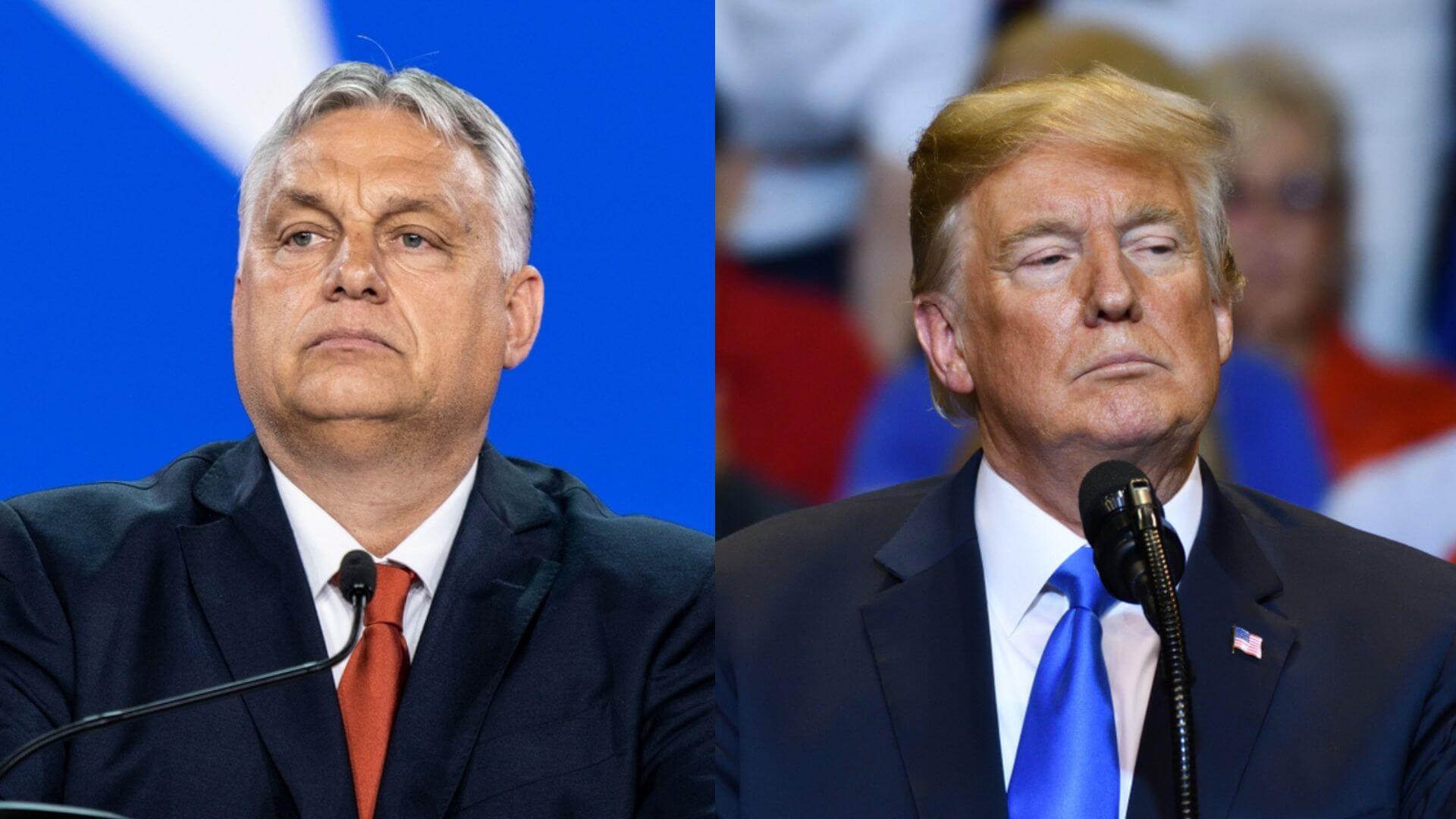The world is beginning to see a shift. Ultra-right politics and ideologies are emerging from the fringes of the political spectrum. It is a dangerous shift to see, especially knowing the trajectory of fascism in the 1920s and 1930s. Despite its association with militarization and territorial conquests, modern fascism — often labeled as neofascism — has abandoned imperialist ideologies. At the same time, it seems to have taken on a quite interesting weapon: conspiracy theories.
World leaders such as Hungarian Prime Minister Viktor Orbán and former US President Donald Trump perpetuate conspiracy theories that polarize voter bases and support ultra-nationalistic ideologies. It seems like fascism has taken upon a new face. No longer are conspiracy theorists and neofascists confined to backwoods musters or clattering away in some dank corner of the internet. Elected officials are now increasingly normalizing and mainstreaming far-right ideas. Across the global stage, far-right groups have quietly breached the mainstream without the cacophonous fury of a coup d’état.
The junction between neofascism and conspiracy theory
Benito Mussolini introduced the ideology of fascism in the 1920s. Fascism was a reactionary response to communism, socialism and liberalism. Neofascism is its modern iteration.
Neofascism encompasses a spectrum of ultra-nationalistic beliefs and practices, but it rejects left-wing, center-left and center-right positions. This modern form of fascism is marked by racial supremacy, populism, authoritarianism and nativism. It strongly opposes liberal democracy, Marxism, communism and socialism, often promoting xenophobic ideas and anti-immigration views. Neofascists have a fanatical focus on their country and its issues, which they blame on immigrants, liberals and those of different racial identities.
A common tool of neofascism is the conspiracy theory. Conspiracy theorists posits that a situation or event is the result of a clandestine plot by influential actors, often with political motives. Not every theory about a conspiracy is a conspiracy theory; rather, the term suggests a reliance on prejudice or insufficient evidence. Often, conspiracy theories are reinforced by circular reasoning where evidence contradicting the conspiracy is reinterpreted as supporting it. Numerous neofascist factions employ conspiracy theories to radicalize individuals and fuel their agendas. The process of radicalization then involves presenting ideas of danger and loss. Neofascists seek to convince people that their way of life is in immediate danger.
Renaud Camus’s “Great Replacement” theory posits that an “elite” is orchestrating the replacement of white Europeans with non-Europeans. Brenton Tarrant, before he perpetrated the Christchurch massacre, endorsed this theory in a manifesto. The Great Replacement is intricately linked to the “White Genocide” narrative, emphasizing white racial supremacy and propagating fear of demographic displacement.
Neofascist groups use these theories to directly radicalize people by perpetuating fear. Right-wing parties often nurture and propagate these ideas to secure voter support for a strong state to play the role of savior.
Therefore, neofascism and the propagation of conspiracy theories go hand in hand. They reinforce each other to establish a new social compact between two groups: a part of society that views a liberal democratic world with fear, and political parties that see the return of neofascism as the only way to stop the decadence and chaos of the world.
The return of fascism in Europe
Orbán’s Fidesz Party has been in power since 2010. Under his leadership, Hungary has become not only one of the most anti-European, pro-Russian and pro-Chinese countries in the European Union but also one of the most conservative and anti-immigration, under the supposed defense of traditional and Catholic values.
Despite being a member of the EU, Hungary sees the EU as threatening their vision of a strong, nationalistic society and economy. In 2019, during the European election campaign, the Orbán government launched a poster campaign with the faces of Hungarian philanthropist George Soros and President of the European Commission Jean-Claude Juncker. The poster read, “You have the right to know what Brussels is planning to do.” Juncker’s chief spokesman Margaritis Schinas accused Hungary of peddling conspiracy theories against the EU.
The poster referred to the compulsory migrant relocation quotas established by the EU. In the eyes of Orbán’s Fidesz Party, Juncker is using his influence and capital to destroy European culture through plans for the mass reception of refugees. The EU even ruled Hungary’s deportation of immigrants as illegal, but Hungary continues to cite the EU with attacks upon its country’s values.
Hungarian citizens fear their values, culture and identity as a people are under attack by the EU. The leaders in Brussels have effectively isolated Hungarians, making them disillusioned in the leadership the EU provides. How could they follow a leader that doesn’t seem to protect their national identity? This is where the seductiveness of a leader like Viktor Orbán comes in.
The simplicity of his moral narratives further bolsters Orbán’s charisma, offering a clear direction and scapegoating the EU government for erasing Hungarian ethnic identity. This fosters a cult of personality in which Orbán is the perfect representative of Hungarian identity. Coupled with Orbán’s strong leadership persona, this attracts moderate Hungarians who perceive him as determined to uphold Hungary’s identity and values.
Orbán thus appeals to moderate Hungarians and attracts them towards the right, threatening the democratic principles of Hungary.
Orbán’s charisma comes from conspiracy theories that allow the disillusioned and radicalized to reallocate blame and responsibility. His conspiracy theories posit that the EU government is determined to erase Hungarian ethnic identity. As cognitive dissonance sets in — “These leaders are supposed to support us, but they’re not!” — Orbán offers an alternate direction. “If the leadership proves to be bad, it must be replaced,” he stated at a conference of European right-wing citizens.
For a disillusioned Hungarian who feels their identity is threatened, the right-wing, neofascist Orbán offers shelter. A lack of appealing leaders turns moderate citizens towards courageous and anti-systemic political leaders offering sharp, revolutionary solutions to systemic problems. As more and more previously moderate masses turn towards radical, neofascist leaders, democracy is on a perilous precipice.
Democracy in the US is under attack
The phenomenon of neofascism is not constrained to Europe’s borders. Despite a myriad of legal troubles, Donald J. Trump is the Republican frontrunner to win the White House for the second time to become the 47th president of the United States. Much may still happen between now and the election time in November 2024, but all significant polls give Trump a lead over other candidates. He leads in most swing states. He is perceived as more trusted on the economy than Joe Biden.
It is also clear that Trump has mostly stayed the same since he left the Oval Office. To begin with, he is a firm election denier. He still defends the theory that the 2020 elections were “stolen.” Despite 91 criminal charges, including a federal case about organizing a conspiracy to defraud the US electoral system, Donald Trump maintains that he is “a victim of one of the biggest smear campaigns in the history of the US,” an expression he uses frequently in his rallies.
There are no facts to support a stolen 2020 election. Yet many groups, organizations, media platforms and paramilitaries on the ideological right still support him. Trump’s candidacy is firmly rooted in the aspirations and ideas of the MAGA movement. Among them, one can find the supporters of the Great Replacement Theory, according to which there is an international conspiracy “to engineer the migration of non-white people to historically white countries in an attempt to ‘replace’ whites with a more pliant racially inferior population.” The idea is to emphasize the suspicion generated by the fear of “others” who are different from “us”.
For a population who is already deeply concerned about the US Federal government
eradicating individual freedoms, racial conspiracy theories offer a way to quell the disillusion of the center-right. Much of the social anger of white male conservatives is displaced. Fearing for their freedoms, conservatives displace their anger from the government to races they deem as a threat. As of now, politics no longer means rationality.
Moderate, centrist or even right-leaning political leaders no longer appeal to the agitated right-wing voter base. Trump is the perfect candidate to fill that vacuum. The charisma of a leader like Trump comes from a seductive idea of protecting the purity of the “real” nation from external degeneration.
Right-wing voters in the US increasingly see their moderate political leaders as unable to offer practical solutions to the problems they see in society. This paves a perfect road toward populist, extremist leaders like Trump. To the extreme right wing, no other option is viable.
A way forward
Extremist, neofascist leaders fuel violent conflicts within already-polarized societies. The challenge, therefore, lies in restoring moderation. A “healthy” critical, rational and mature conservatism must be rescued from the irrationality of neofascism and the disillusioned people.
Governments must begin to take social grievances seriously. We must revisit everything from concrete conditions like the daunting cost of living to deep issues like the prioritization of systems over the individual. Only vigilance and active participation in civic culture and public life can repress the scourge of neofascism.
We must learn our lessons from the dangerous rise of neofascism. Until then, the world watches with bated breath.
The views expressed in this article are the author’s own and do not necessarily reflect Fair Observer’s editorial policy.
Support Fair Observer
We rely on your support for our independence, diversity and quality.
For more than 10 years, Fair Observer has been free, fair and independent. No billionaire owns us, no advertisers control us. We are a reader-supported nonprofit. Unlike many other publications, we keep our content free for readers regardless of where they live or whether they can afford to pay. We have no paywalls and no ads.
In the post-truth era of fake news, echo chambers and filter bubbles, we publish a plurality of perspectives from around the world. Anyone can publish with us, but everyone goes through a rigorous editorial process. So, you get fact-checked, well-reasoned content instead of noise.
We publish 3,000+ voices from 90+ countries. We also conduct education and training programs
on subjects ranging from digital media and journalism to writing and critical thinking. This
doesn’t come cheap. Servers, editors, trainers and web developers cost
money.
Please consider supporting us on a regular basis as a recurring donor or a
sustaining member.
Will you support FO’s journalism?
We rely on your support for our independence, diversity and quality.











Comment